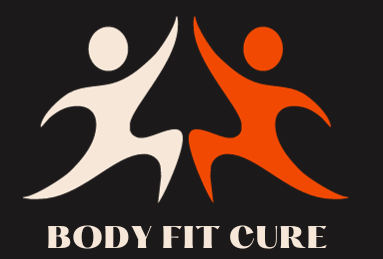In this article, we will explore the top 9 superfoods that are high in Vitamin B12. These nutrient-rich foods are not only great for maintaining energy levels but also crucial for overall health. Incorporating these superfoods into your diet can provide you with the necessary Vitamin B12 for optimal functioning and well-being. Let’s take a closer look at these superfoods and how they can benefit your health.
Key Takeaways:
- Include these 09 superfoods rich in vitamin B12 in your diet for increased energy and overall health.
- Vitamin B12 is essential for energy production, the formation of red blood cells, DNA synthesis, and neurological function.
- Animal-based and plant-based sources offer various options for individuals following different dietary preferences.
- Vitamin B12 plays a crucial role in energy metabolism and brain health.
- Meat, poultry, fish, dairy, eggs, and fortified foods are all excellent sources of Vitamin B12.
The Essential Role of Vitamin B12 in Your Diet
Vitamin B12 is a vital nutrient that plays a crucial role in several bodily functions. It is essential for energy production, the formation of red blood cells, DNA synthesis, and neurological function. Adequate intake of Vitamin B12 is vital for maintaining healthy nerve cells and supporting brain health.
One of the key benefits of Vitamin B12 is its role in energy metabolism. It helps convert food into energy, ensuring that the body has the fuel it needs to function optimally. Without sufficient Vitamin B12, you may experience fatigue, weakness, and a general lack of energy.
In addition to its role in energy production, Vitamin B12 is also essential for the formation of red blood cells. It helps in the production of hemoglobin, the protein that carries oxygen throughout the body. Without enough Vitamin B12, the production of red blood cells can be impaired, leading to anemia and associated symptoms such as weakness and shortness of breath.
Vitamin B12 is also critical for proper neurological function. It supports the maintenance of the myelin sheath, a protective covering around nerves that helps facilitate their communication. Adequate Vitamin B12 levels are crucial for healthy nerve cells and optimal brain function.
“Vitamin B12 is essential for energy production, the formation of red blood cells, DNA synthesis, and neurological function.”
However, Vitamin B12 deficiency is not uncommon, especially among certain groups of people. Individuals following a strict vegetarian or vegan diet, as well as older adults and those with certain medical conditions, may be at a higher risk of deficiency. If left untreated, Vitamin B12 deficiency can have serious health consequences, including memory problems, nerve damage, and even anemia.
Understanding the importance of Vitamin B12 in your diet is crucial for maintaining optimal health. Incorporating Vitamin B12-rich foods into your meals or considering supplements when necessary can help ensure that you meet your daily Vitamin B12 requirements and enjoy the benefits it provides.
09 Superfoods Rich in Vitamin B12
Vitamin B12 is an essential nutrient that plays a crucial role in various bodily functions. It is important to incorporate foods rich in Vitamin B12 into your diet to maintain optimal health and well-being. In this section, we will explore nine superfoods that are particularly high in Vitamin B12, providing you with natural sources of this vital nutrient.
Unlocking the Power of Animal-Based B12 Sources
Animal-based sources such as meat, poultry, and fish are excellent options for obtaining Vitamin B12. These foods not only provide ample amounts of Vitamin B12, but they are also rich in other essential nutrients that contribute to overall health. Including these animal-based sources in your diet can help you meet your daily Vitamin B12 requirements.
Exploring Plant-Based Vitamin B12 Alternatives
For those following vegetarian or vegan diets, finding plant-based sources of Vitamin B12 is essential. While Vitamin B12 is mostly found in animal-based foods, there are plant-based alternatives that can help supplement your intake. Some examples include fortified plant-based milk, nutritional yeast, and certain types of algae. These alternatives offer a natural source of Vitamin B12 for individuals following plant-based diets.
The Importance of Vitamin B12 for Vegetarians and Vegans
Individuals following vegetarian or vegan diets are at higher risk of Vitamin B12 deficiency, as plant-based sources are limited. Vitamin B12 is crucial for maintaining healthy nerve cells, supporting brain health, and preventing anemia, among other functions. It is important for vegetarians and vegans to be mindful of their Vitamin B12 intake and consider fortified foods or supplements to ensure they meet their nutritional needs.
| Superfood | Vitamin B12 Content |
|---|---|
| Beef Liver | 85.7 mcg per 100g |
| Clams | 98.9 mcg per 100g |
| Turkey | 1.2 mcg per 100g |
| Sardines | 8.9 mcg per 100g |
| Salmon | 4.9 mcg per 100g |
| Chicken | 0.3 mcg per 100g |
| Yogurt | 0.5 mcg per 100g |
| Eggs | 0.6 mcg per 100g |
| Nutritional Yeast | 33.3 mcg per 100g |
These superfoods are not only delicious but also provide a significant amount of Vitamin B12 to support your overall health. By incorporating a variety of animal-based and plant-based sources in your diet, you can ensure that your body receives the Vitamin B12 it needs.
How Vitamin B12 Boosts Energy and Overall Health
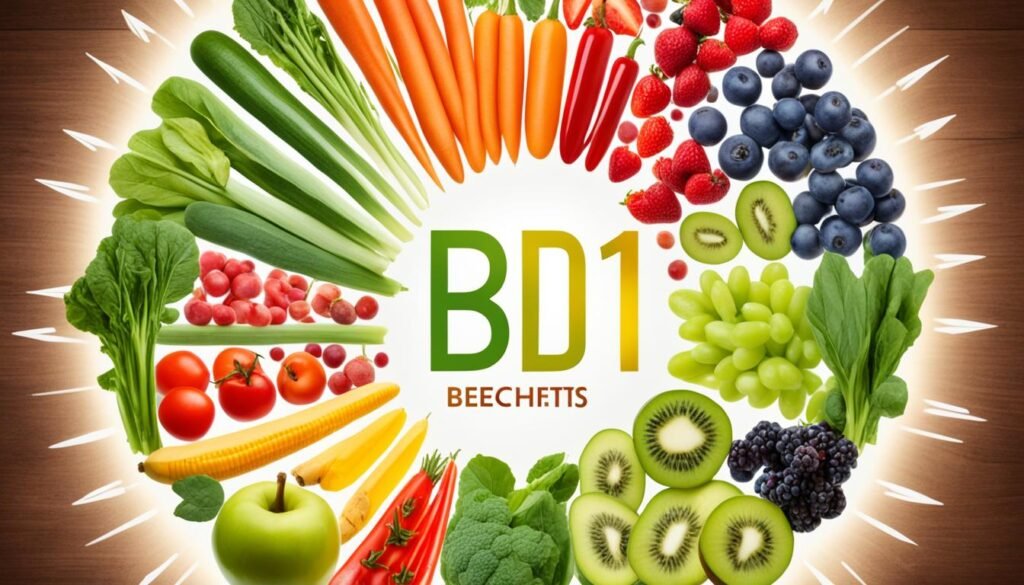
Vitamin B12 is a vital nutrient that plays a crucial role in boosting energy levels and promoting overall health. It is essential for numerous bodily functions, including energy metabolism and brain health.
Science Behind Vitamin B12’s Role in Energy Metabolism
Vitamin B12 is actively involved in energy metabolism, which is the process by which the body converts food into usable energy. This vitamin helps convert carbohydrates into glucose, the body’s primary source of energy. It also aids in the breakdown of fatty acids and proteins, contributing to a well-functioning metabolism.
By optimizing energy metabolism, Vitamin B12 helps combat fatigue, enhances physical performance, and increases overall energy levels. Adequate consumption of Vitamin B12-rich foods is crucial to ensure optimal energy production and utilization in the body.
Vitamin B12’s Impact on Brain Health and Cognitive Function
Vitamin B12 plays a vital role in maintaining brain health and cognitive function. It is necessary for the synthesis of neurotransmitters that support proper brain function, including serotonin and dopamine. These neurotransmitters help regulate mood, memory, and concentration.
Research suggests that Vitamin B12 deficiency may be associated with cognitive decline, memory problems, and an increased risk of neurological disorders such as dementia and Alzheimer’s disease. By ensuring sufficient intake of Vitamin B12, you can support healthy brain function and preserve cognitive abilities.
Top Foods for Vitamin B12: Meat, Poultry, and Fish
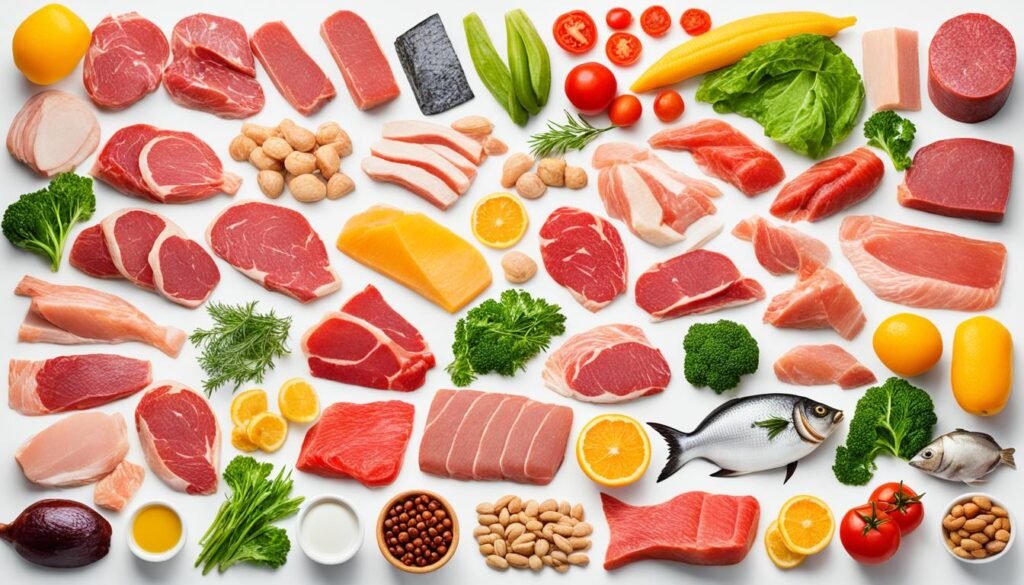
When it comes to getting your daily dose of Vitamin B12, meat, poultry, and fish are your go-to options. These animal-based foods are not only delicious but also rich in this essential nutrient. Including them in your diet can provide significant amounts of Vitamin B12 and help support your overall health.
Let’s take a closer look at the specific types of meat, poultry, and fish that are particularly high in Vitamin B12:
- Beef: Beef, especially organ meats like liver, is an excellent source of Vitamin B12. Consuming lean cuts of beef provides a substantial amount of this nutrient.
- Chicken: Chicken, particularly the dark meat, is a great option for Vitamin B12. Including chicken thighs or drumsticks in your meals can boost your intake.
- Turkey: Turkey is another poultry option that is rich in Vitamin B12. Enjoying a roasted turkey breast or ground turkey can help you meet your daily requirements.
- Salmon: Salmon is a fatty fish that not only provides heart-healthy omega-3 fatty acids but also contains Vitamin B12. Grilling or baking salmon fillets can be an excellent way to incorporate this nutrient into your diet.
- Tuna: Tuna is another fish that is high in Vitamin B12. Whether canned or fresh, tuna can be a versatile ingredient in various dishes, providing both flavor and nutrition.
These foods not only offer a good amount of Vitamin B12 but also come with additional nutritional benefits. Meat, poultry, and fish are excellent sources of protein, iron, and various other essential nutrients. Including them in your meals can contribute to a well-rounded and nutritious diet.
Remember, if you have specific dietary restrictions or prefer a plant-based diet, there are other sources of Vitamin B12 that we will explore in the upcoming sections.
Natural Sources of Vitamin B12: Dairy and Eggs
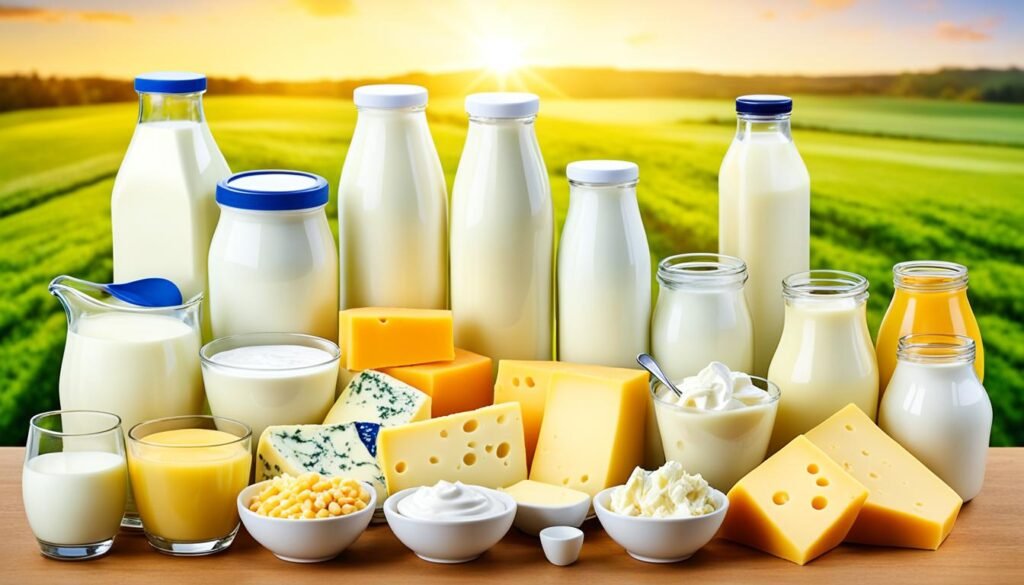
Dairy products and eggs are natural sources of Vitamin B12. Including these foods in your diet can help boost your Vitamin B12 intake. Not only are they delicious and versatile, but they also provide essential nutrients for your body.
Incorporating dairy products into your meals can be as simple as enjoying a glass of milk or adding yogurt to your breakfast. Cheese options such as cheddar, Swiss, and feta are also rich in Vitamin B12. These dairy choices not only provide the necessary Vitamin B12 but also offer calcium, protein, and other beneficial vitamins and minerals.
Eggs are another excellent source of Vitamin B12. Whether scrambled, boiled, or incorporated into various recipes, eggs provide a nutrient-packed option to support your Vitamin B12 intake. They are also rich in protein, vitamins, and minerals that contribute to overall health.
By including dairy products and eggs in your meals, you can naturally boost your Vitamin B12 levels. These foods not only provide essential nutrients but also add variety and flavor to your diet.
Finding Vitamin B12 in Plant-Based Diets
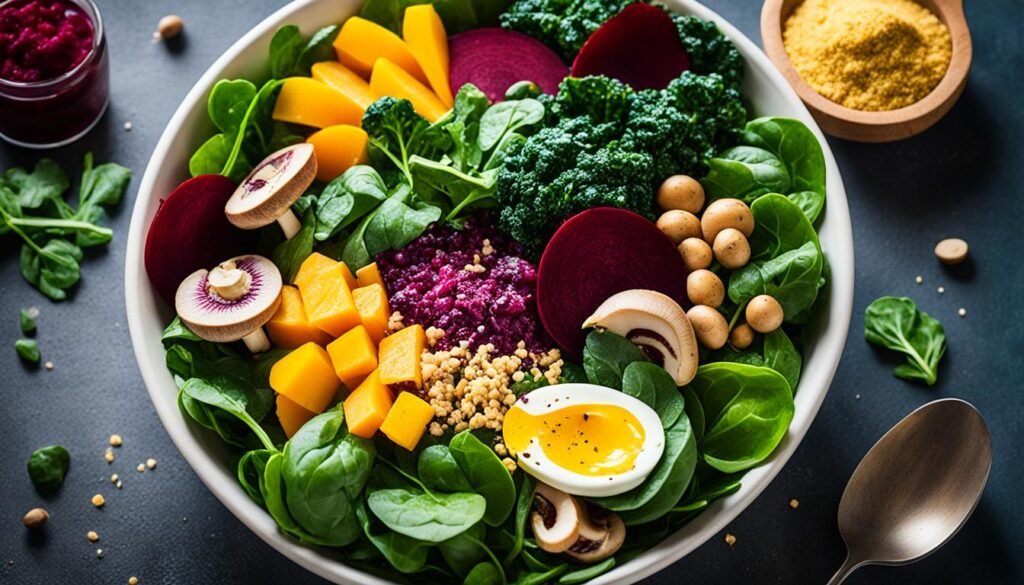
For individuals following plant-based diets, finding Vitamin B12 sources becomes crucial. While animal-based foods are rich in this essential nutrient, there are plant-based alternatives that can help vegetarians and vegans ensure they meet their Vitamin B12 requirements without relying solely on animal-based sources.
One plant-based option is nutritional yeast. Nutritional yeast is a deactivated yeast that provides a cheesy and nutty flavor to dishes. It is often fortified with Vitamin B12, making it an excellent choice for individuals looking for a plant-based Vitamin B12 source.
Another plant-based Vitamin B12 alternative is fortified plant-based milk. Many brands fortify their plant-based milk products with Vitamin B12 to ensure they provide adequate nutritional value. Popular options include soy milk, almond milk, and oat milk. Be sure to check the labels to ensure the milk is fortified with Vitamin B12.
Certain types of algae, such as spirulina and nori, can also contain Vitamin B12. While the levels may vary, including these algae in your diet can contribute to your overall Vitamin B12 intake.
It is important to note that while plant-based alternatives can provide Vitamin B12, they may not be as reliable as animal-based sources. Therefore, it is advisable for individuals following plant-based diets to regularly monitor their Vitamin B12 levels and consider supplementation if needed.
Enhanced Nutrition: Fortified Foods High in Vitamin B12
Fortified foods are products that have added nutrients not originally present in the food. They are a convenient option for individuals with dietary restrictions or those who struggle to meet their Vitamin B12 needs through natural sources alone. Fortified foods high in Vitamin B12 can provide an effective way to enhance your overall nutrition.
“Fortified foods offer a practical solution for individuals who may have limited access to natural sources of Vitamin B12.”
By fortifying certain foods with Vitamin B12, manufacturers ensure that these products can contribute significantly to your daily intake of this vital nutrient. Whether you’re following a vegetarian or vegan diet, or simply looking to supplement your Vitamin B12 intake, fortified foods offer a wide range of options to support your nutritional needs. Incorporating these foods into your diet can help bridge the gap and ensure you’re getting sufficient Vitamin B12 for optimal health.
| Fortified Foods | Vitamin B12 Content |
|---|---|
| Fortified breakfast cereals | Varies by brand; can provide up to 100% of the recommended daily intake per serving |
| Fortified plant-based milk alternatives (such as soy, almond, or oat milk) | Varies by brand; can provide around 50% of the recommended daily intake per serving |
| Fortified nutritional yeast | Approximately 2.4 micrograms of Vitamin B12 per tablespoon |
| Fortified meat substitutes (such as veggie burgers or vegan sausages) | Varies by brand; can provide a significant amount of Vitamin B12 per serving |
When incorporating fortified foods into your diet, it’s important to read product labels and choose options that provide adequate levels of Vitamin B12. Additionally, it’s essential to maintain a balanced diet, incorporating a variety of nutrient-rich foods, to ensure overall nutritional well-being.
Remember, while fortified foods can be a valuable source of Vitamin B12, they should not replace other natural food sources. It’s always beneficial to consult with a healthcare professional or registered dietitian to determine the best approach to meet your specific Vitamin B12 needs.
Creative Ways to Include B12 Foods into Your Daily Meals
Incorporating B12-rich foods into your daily meals can be delicious and easy. By adding these nutrient-packed ingredients to your recipes, you can ensure that you’re meeting your daily Vitamin B12 requirements. Here are some creative ideas to help you include B12 foods in your meals:
Easy B12-Rich Recipes for Busy Lifestyles
If you have a hectic schedule, it’s essential to have quick and easy recipes that are also rich in Vitamin B12. Here are a few ideas:
- Omelette with Salmon and Spinach: Beat eggs, add cooked salmon and sautéed spinach, and cook until set. This protein-packed meal is not only delicious but also a great source of Vitamin B12.
- Veggie Stir-Fry with Tofu: Sauté your favorite vegetables with tofu, soy sauce, and garlic. This tasty stir-fry is not only packed with flavor but also provides a good amount of Vitamin B12.
- Chicken and Quinoa Salad: Combine cooked quinoa with grilled chicken, mixed greens, cherry tomatoes, and a lemon dressing. This refreshing salad is not only nutritious but also a great way to incorporate Vitamin B12 into your diet.
These easy recipes can be prepared in no time and are perfect for busy individuals who want to enjoy the benefits of Vitamin B12-rich meals.
Strategies for Meal Planning with Vitamin B12 in Mind
When meal planning, it’s essential to keep Vitamin B12 in mind to ensure you’re meeting your nutritional needs. Here are some strategies to help you include Vitamin B12 in your meal plans:
- Include B12-rich foods in your grocery list: Make sure to add foods like salmon, eggs, and dairy products to your shopping list to ensure you have them on hand when planning your meals.
- Plan meals that incorporate B12 sources: Consider creating meals that feature B12-rich ingredients, such as chicken with roasted vegetables or a tofu stir-fry with leafy greens.
- Prep B12-rich ingredients in advance: Wash, chop, and cook B12-rich ingredients ahead of time to make meal preparation faster and more convenient during busy weekdays.
- Experiment with new recipes: Explore new recipes that showcase B12-rich foods in delicious and exciting ways. This can help you stay motivated and enjoy your meals while getting the necessary Vitamin B12.
By implementing these strategies, you can ensure that your meal plans include ample Vitamin B12-rich options, making it easier to maintain a healthy and well-rounded diet.
| Food | Vitamin B12 Content (per serving) |
|---|---|
| Salmon (3 ounces) | 4.9 mcg |
| Eggs (1 large) | 0.6 mcg |
| Plain nonfat Greek yogurt (6 ounces) | 1.5 mcg |
| Fortified breakfast cereal (1 cup) | 6.0 mcg |
| Chicken breast (3 ounces) | 0.3 mcg |
| Firm tofu (3 ounces) | 1.2 mcg |
Table: Vitamin B12 Content in Select Foods
Vitamin B12 Supplements: When Diet Isn’t Enough
While it is ideal to obtain Vitamin B12 from natural food sources, there are instances when dietary intake may not be sufficient. In such cases, Vitamin B12 supplements play a vital role in ensuring optimal Vitamin B12 levels. These supplements can help bridge the gap between what you consume and what your body needs for proper functioning and overall health.
Choosing the right Vitamin B12 supplement is essential to ensure effectiveness and safety. Look for high-quality supplements from reputable brands that provide the recommended dosage of Vitamin B12. It is also beneficial to consult with a healthcare professional who can guide you through the selection process and recommend the appropriate supplement based on your specific needs.
Conclusion
Incorporating Vitamin B12-rich superfoods into your diet is essential for maintaining energy levels, supporting overall health, and preventing deficiencies. Vitamin B12 plays a crucial role in energy production, the formation of red blood cells, DNA synthesis, and neurological function. Adequate intake of Vitamin B12 can prevent fatigue, weakness, memory problems, and even anemia.
By including a variety of animal-based and plant-based sources in your meals, you can ensure you meet your daily Vitamin B12 requirements. Animal-based foods like meat, poultry, and fish are rich in Vitamin B12 and provide significant amounts of this essential nutrient. For vegetarians and vegans, exploring plant-based alternatives such as nutritional yeast, fortified plant-based milk, and certain types of algae is crucial for obtaining sufficient Vitamin B12.
In addition to natural sources, fortified foods offer an excellent option for enhancing your Vitamin B12 intake. Fortified foods that are rich in Vitamin B12 can provide additional nutrients to meet your dietary needs. Lastly, if dietary intake alone is not enough, Vitamin B12 supplements can be used to ensure optimal levels of this essential vitamin in your body.
Boost your energy and promote your well-being by prioritizing Vitamin B12-rich foods, incorporating a balanced selection of animal-based and plant-based sources, fortified foods, and supplements when necessary. By making these choices, you can enjoy the benefits of Vitamin B12 for your overall health and vitality.
